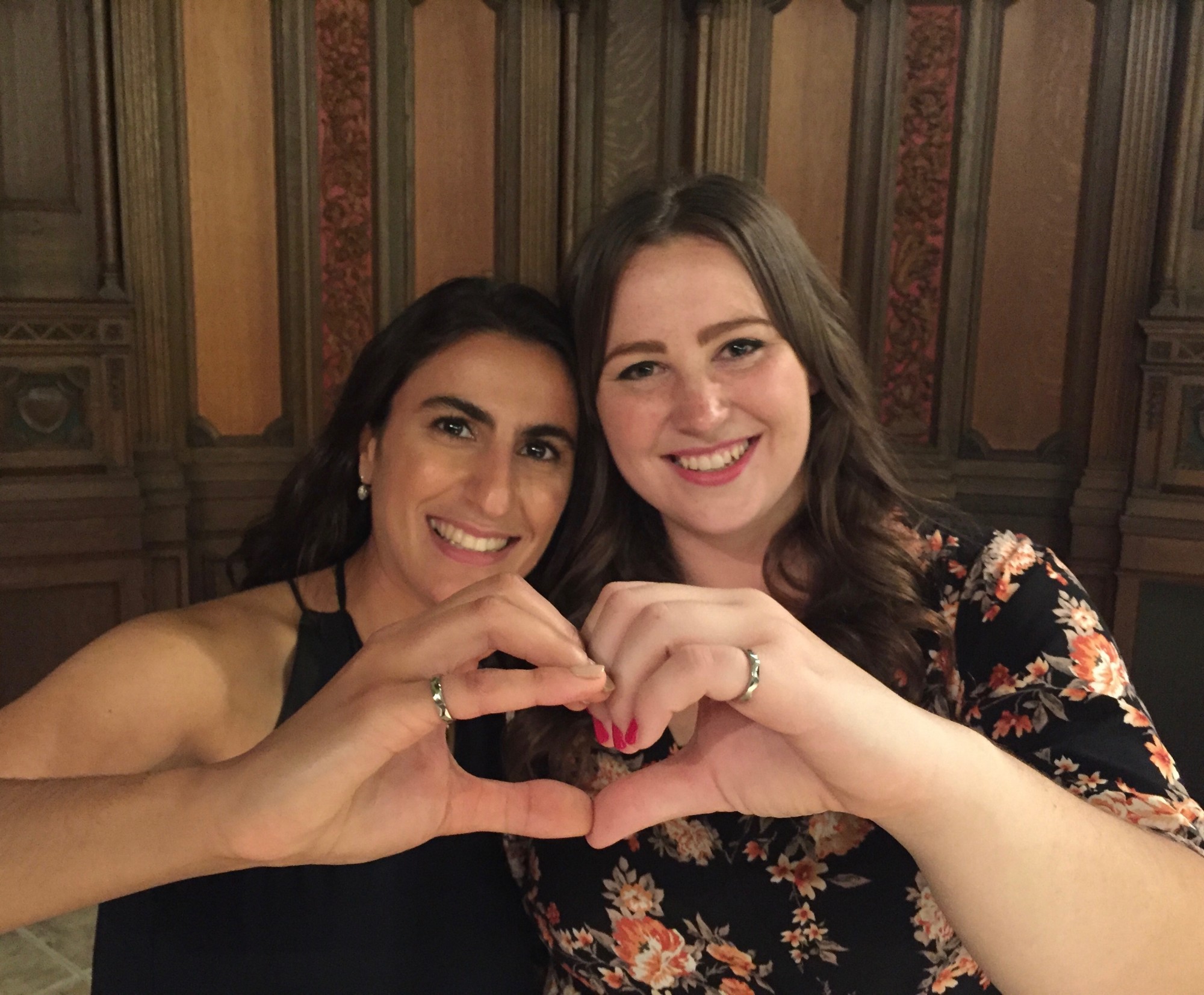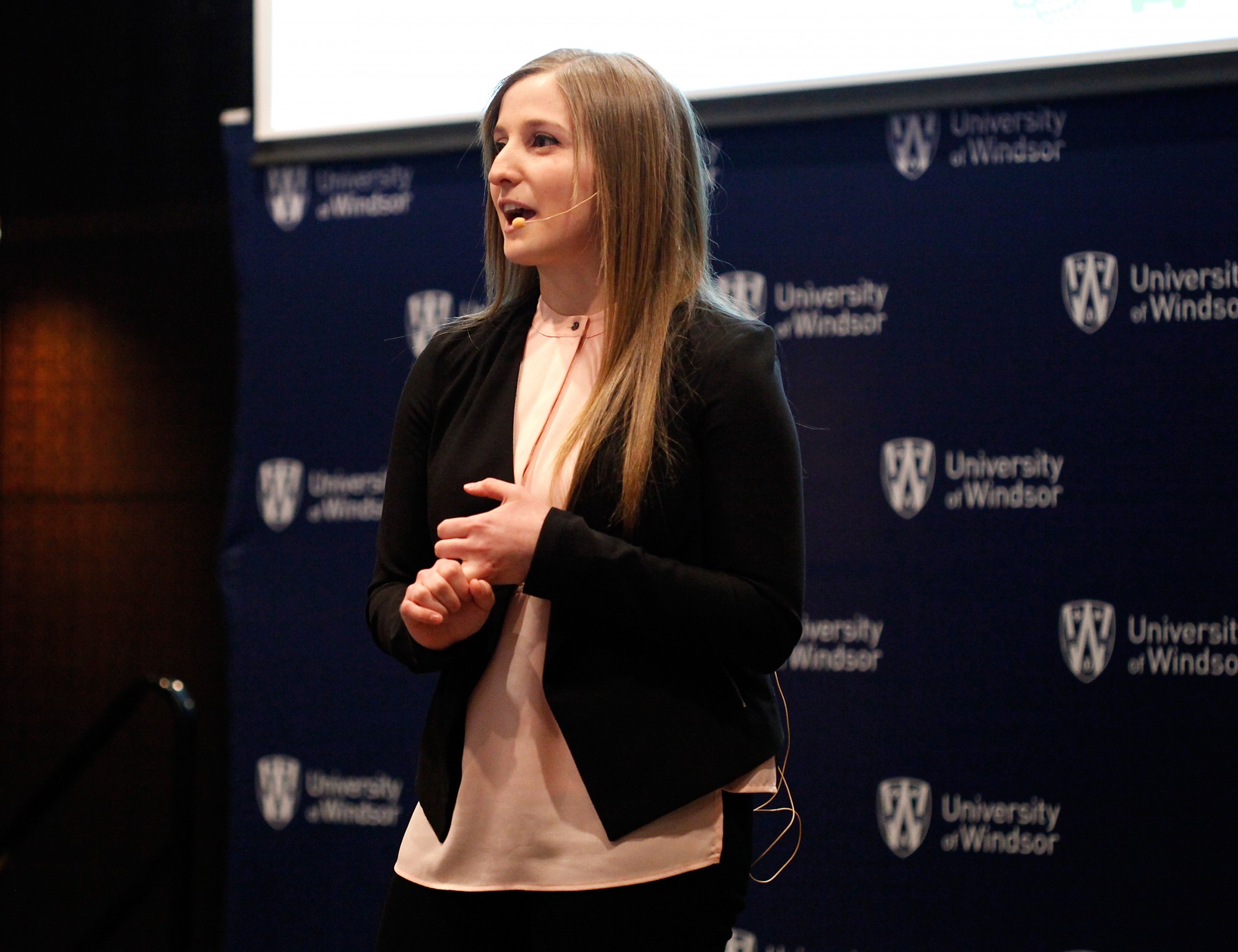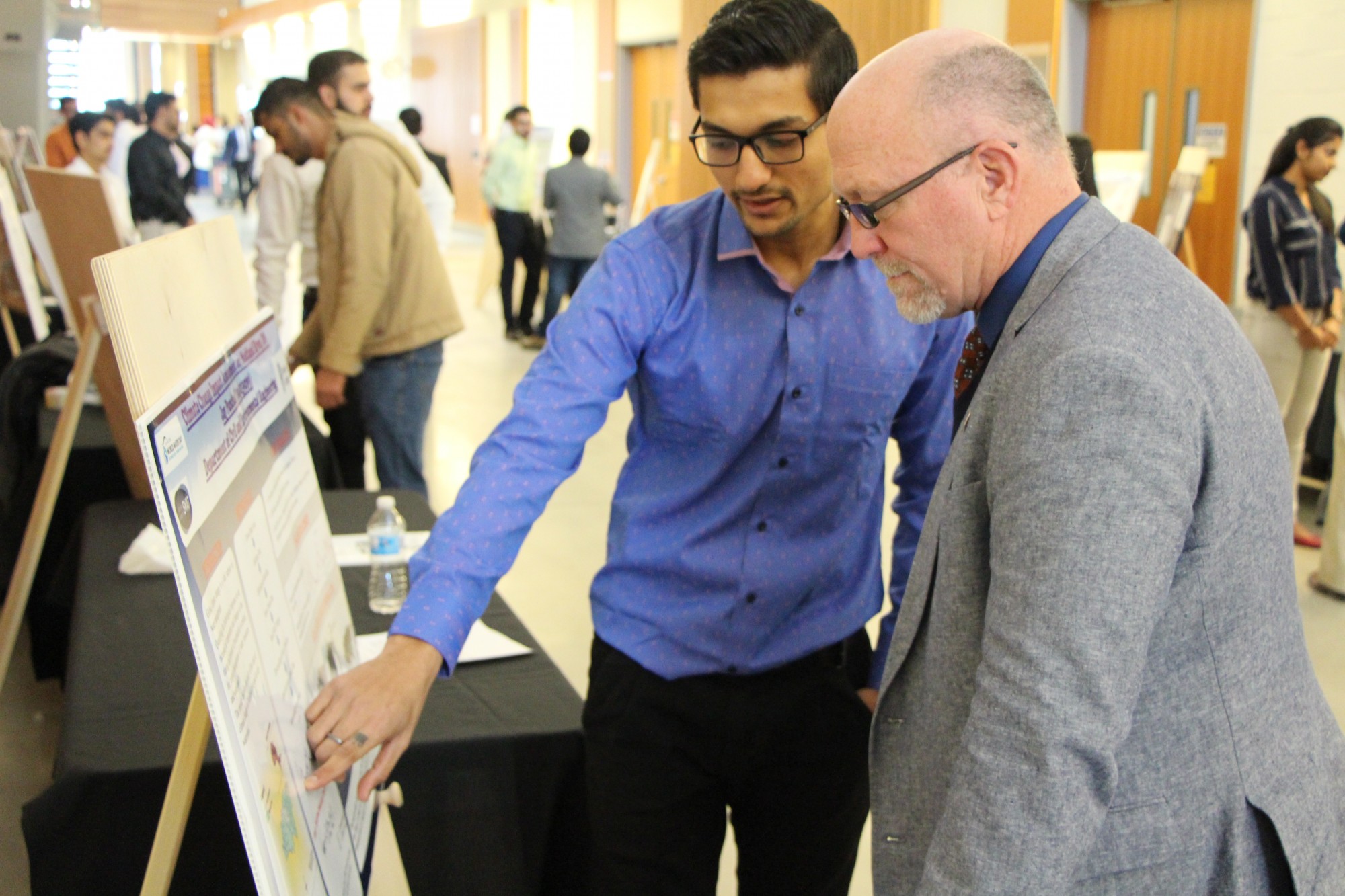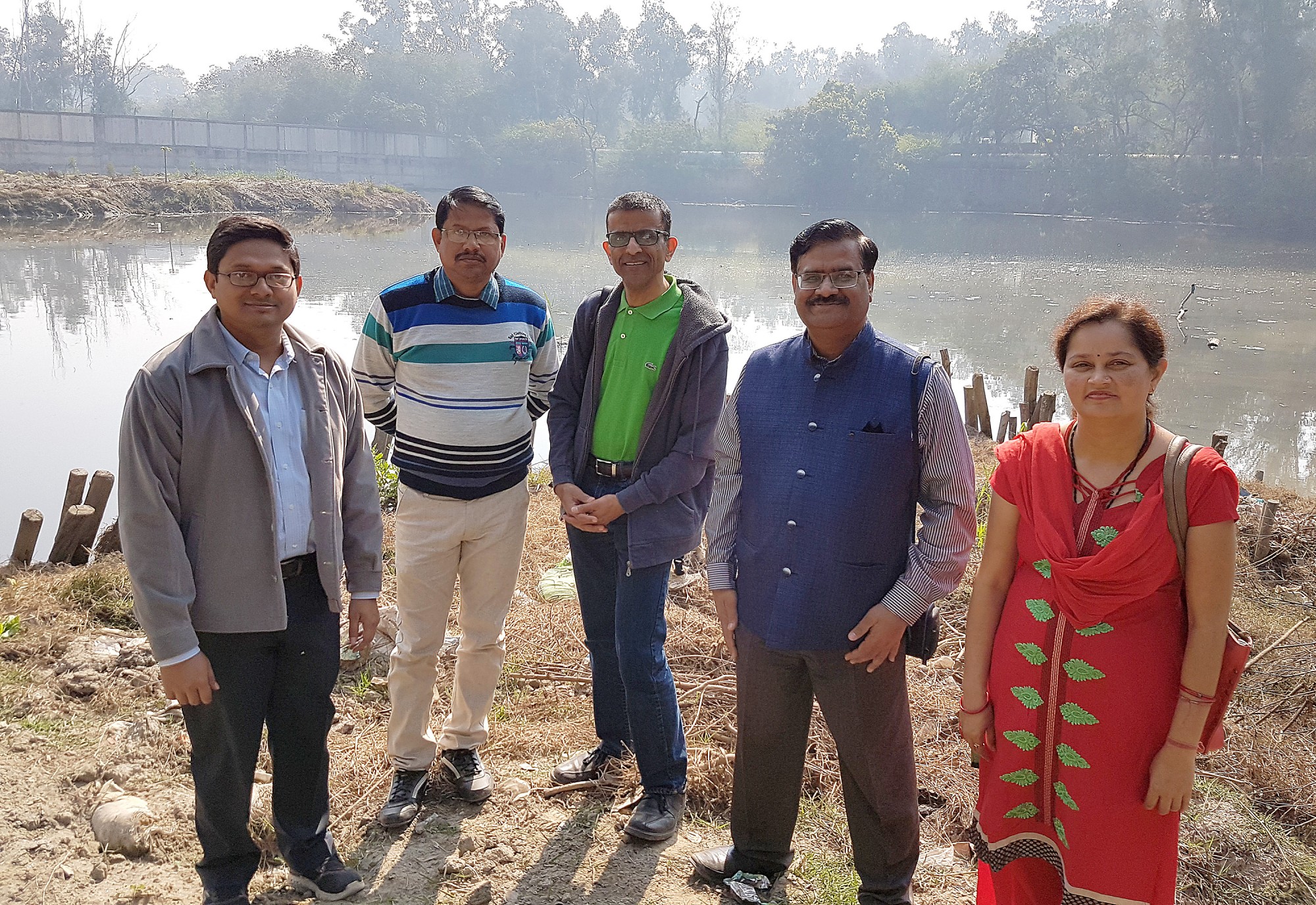
High academic performances and leadership skills landed 21 University of Windsor engineering students scholarships from the Ontario Professional Engineers Foundation for Education.
Asif Khan, chair of the Windsor-Essex chapter of Professional Engineers Ontario, awarded students on behalf of the foundation during a ceremony at the Ed Lumley Centre for Engineering Innovation for recipients who received scholarships in the past three years.
“For me, the most significant benefit has been that the financial support has allowed me to fully dedicate my time and energy into succeeding in my studies,” said Steven Vrantsidis, a recipient of the foundation’s $1,500 Entrance Scholarship.
The Ontario Professional Engineers Foundation for Education (OPEFE) is a charitable foundation run by a volunteer board of directors that provides scholarships to encourage engineering students to pursue careers in the profession. The scholarships are financed through donations from professional engineers in Ontario, as well as corporate and individual donations.
— Published on Jan 7th, 2021

University of Windsor engineering students clinched three of four scholarships offered province-wide by the Ontario Society of Professional Engineers.
In partnership with The Personal Insurance Company, the society annually awards two undergraduate and two graduate students enrolled in engineering programs across Ontario.
UWindsor’s Chrissy Ure and Rania Toufeili, both environmental engineering MASc students and
Adib Shamsuddin, an undergraduate mechanical engineering student in the automotive stream, will each receive a $2,500 scholarship towards their engineering education.
The three were recognized for their academic excellence and volunteer activities on campus and in the community.
— Published on Jan 7th, 2021

Several University of Windsor engineering students and alumni were honoured during a local celebration of the engineering profession.
Windsor’s Engineering Month Committee hosts an annual awards luncheon to “bring public awareness to the diversity and importance of the exciting fields of engineering and technology and invite prospective students to consider these professions,” said Tina Hawco, chair of the Engineering Month Committee.
The committee is comprised of engineers and technologists from local municipalities, consulting engineering firms, the University of Windsor, St. Clair College, professional associations and industry.
Priscilla Williams, a PhD candidate in the civil and environmental engineering department, Michael Cappucci, BASc ’11, and Aaron Blata, BASc ’14, were named the Top Three Under 30 during a ceremony April 13, 2018 at the Fogolar Furlan Club for demonstrating higher than average abilities to undertake engineering projects, outstanding work ethic and leadership early in their careers.
— Published on Jan 7th, 2021

A UWindsor Engineering graduate student represented the University of Windsor at a provincial Three Minute Thesis competition.
Liza-Anastasia Di-Cecco, a master's student in Materials Engineering, presented her 3D printing research at the Ontario 3MT® competition final on April 19, 2018 at York University.
Di-Cecco had three minutes and a single presentation slide to deliver her presentation titled "Move over plastic, we're 3D printing titanium."
"In my research, I’m studying the material properties of pure titanium made through a specific 3D printing process using plasma fabrication," Di-Cecco said. "I’m concentrating on looking at their strength, hardness, and durability, while also looking at what’s happening at the microscopic level to characterise these parts."
Di-Cecco said 3D printing is expanding our ability to make parts and more complex items such as custom prosthetics and orthotics and lighter and more fuel efficient cars.
"Even advanced rocket fuel nozzles that might someday get us to Mars; The possibilities of this research are endless," she added.
Three UWindsor Engineering graduate students made it to the final six in the University of Windsor's Three Minute Thesis competition where Di-Cecco took home a second-place prize of $500.
— Published on Jan 7th, 2021

Swollen by rain and melting snow, the Thames River burst its banks in February, inundating southwestern Ontario with its worst floods in 40 years.
The effects of such a catastrophe can be mitigated, says Monika Saha, a master’s candidate in civil engineering, and one of more than 20 students who presented projects in the Centre for Engineering Innovation on Thursday, March 22, in celebration of World Water Day.
Saha is working to create models of the lower Thames River that can predict floods in Chatham-Kent.
“We’ll basically capture the flow. With our hydrologic and hydraulic models getting the input level, it will give you the output to predict which areas will be inundated,” she said. “You will be able to take precautions.”
— Published on Jan 7th, 2021

Renewable energy workshops designed and led by UWindsor engineering professors are gaining steam nationwide.
Professor Rupp Carriveau, who helps lead the international Offshore Energy and Storage Society and directs UWindsor’s Environmental Energy Instituteand Turbulence and Energy Lab, said UWindsor’s latest renewable energy workshop on January 29 will focus on offshore systems in Canada.
“We want to start a conversation to evaluate the potential for a thriving offshore renewable energy sector in Canada and Canada’s role in the global market,” he said. “We want to see what the opportunities and obstacles are for us as a country so we’re ready and not caught flat-footed.”
— Published on Mar 6th, 2018

Dylan Verburg grew up on a farm, and his experience with small construction projects there has proven invaluable in his current challenge — deploying equipment in a drainage pond outside the Indian capital of New Delhi in an attempt to improve water quality.
“Two 50-foot sections of tubing were placed … with the intention of oxidizing the inlet stream before it mixes with the main body of the lake,” the civil engineering student writes in a blog on the Windsor Engineering website. “Six additional lines are placed strategically in the main body of the lake,” located along the Yamuna River in North Delhi.
He will measure the resulting changes, which aim to aerate the water, allowing beneficial bacteria to flourish and naturally restore the ecosystem.
— Published on Jun 8th, 2018

An injection of nearly $2 million in federal funds will aid University of Windsor researchers like Daniel Green, who is helping automakers incorporate lightweight sheet materials into their vehicles.
The automotive sector is turning to lightweight materials as an alternative to steel to improve fuel efficiency. However, lower-density metals tend to have limited formability, says Dr. Green, an associate professor who specializes in materials engineering.
“Innovative forming processes need to be developed and optimized for the production of automotive parts,” he said. “With high-speed forming, we can get 100 per cent more formability than we can with conventional stamping.”
Green is one of 14 UWindsor engineering professors who was awarded funding through the 2017 Discovery Grants Program — an annual competition run by the Natural Sciences and Engineering Research Council of Canada (NSERC) to advance research in Canadian universities.
— Published on Jan 7th, 2021

A team of engineering students has designed a cost-effective and sustainable erosion control structure that will help protect a children’s camp based at the riverbank of the Saugeen River in Walkerton, Ontario.
“The outer banks of river bends are often subjected to erosion due to the force of the flowing water, which sweep sediments downstream,” said Karla Gorospe, a civil engineering MASc candidate, who worked on the student capstone project. “To minimize the erosive effects of the flowing water at Camp Cherith, we designed a hybrid system that includes a series of rock structures called bendway weirs and woody plants. While the bendway weirs help in redirecting the flow away from the bank, the woody plants and tree cuttings stabilize the soils.”
Camp Cherith, a Christian camp for children and youth, approached the university in fall 2016 to seek help with its erosion problem, which has resulted in significant property loss and affected regular camp activities.
— Published on Jun 8th, 2018
— Published on Jan 7th, 2021










